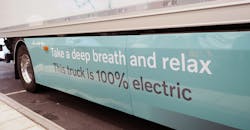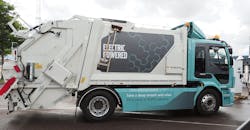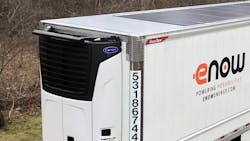Benefits of electric trucks you didn't know were there
Some advantages of electric trucks are often cited: they're much quieter and have no harmful emissions, for instance. Many truck brands, from Isuzu to Freightliner to Kenworth and Volvo, have real electric test units being used now in fleets. It's not just to find any "pain points" and what needs improving—they're looking for (and finding) unexpected benefits electric trucks could bring.
Already there are examples of how fleets and their customers could see a variety of improvements from electric-powered trucks vs. diesel ones.
Reduced inventories.
Electric trucks could help customers receiving deliveries cut back on the supply stock they need to keep on-hand and thereby save money. Huh?
Yes, that's one little detail of what Volvo Trucks has found as the company has been testing out its electric trucks in Europe. Volvo is working with select customers to put its FE and FL European model cabovers with battery-electric powertrains to use even as a project is now taking shape to roll out all-electric Volvo North American trucks in California and, in time, the market at large.
But in European trials, Volvo found that electric trucks could help customers such as restaurants or stores reduce inventory, noted Jonas Odermalm, head of product strategy for the FL and FE trucks. He explained that quiet electric trucks have been able to operate at off-hours/ in the middle of the night when diesel trucks would be prohibited, and it has helped these businesses save money.
"They know that they have everything they need and they can run and plan the day accordingly," he told Fleet Owner. "There were always hiccups with daytime deliveries, so [the customers] needed to have double amounts of all ingredients in the store and they didn't really know whether they would get their shipment in time."
"There's more precision, so the receiver can reduce their inventory," he continued. "That is really important, and it becomes a more energy-efficient operation."
Ounce-for-ounce more efficient.
Fleets today can calculate to the penny how much each pound of freight costs to deliver under their current business models using diesel trucks. Leave aside acquisition costs (which currently are higher for electric trucks vs. diesels) and maintenance costs (which are lower for electric trucks) for a moment.
Volvo has also calculated that its electric trucks can be multiple times more efficient than diesel counterparts at moving the same freight, and that means electric trucks potentially are a more cost-effective mode of transport.
That's in part thanks to regenerative braking—spinning an electric motor backwards to act as a generator and produce charge when it's not accelerating—which recaptures electric power and slows the vehicle so the system brakes are used less, also reducing maintenance needs.
"The energy efficiency calculation is about comparing the efficiency map of the diesel and losses in the transmission chain with the efficiency of the electric drivetrain and energy recuperation while braking," said Edward Jobson, vice president of electromobility at Volvo Trucks.
He gave an example of a city refuse truck, which can have a low average speed of about 12.5 mph and average load of about 15% of its maximum.
"The average efficiency of a diesel at this very low-load case is about 20%," he noted. "The electric drivetrain will have about 80% efficiency at a low-load case. Together with some brake energy recuperation and more efficient auxiliary drives, this will lead to about five times higher efficiency for the electric drive."
Moving power storage units.
It's no secret the world's energy needs are increasing—even things that worked before with mechanical technology are being made electronic/ digital, and mobile devices and other things that need juice are expanding by leaps and bounds around the world.
But if you wanted to add battery-electric trucks hauling the same loads as a diesel can, that's an entirely different proposition and requires enormously more power. As others have, Stephen Voller, founder and CEO of battery innovator Zap&Go, pointed out that the charging infrastructure isn't there to send electric trucks over the road even if you wanted to.
"Very few people have thought about the charging infrastructure that will be required and the effect it will have on the grid," which in the United States in some cases is about half a century old, he noted. Using a basic example, it might take 1 Megawatt hour of energy—the equivalent of a million watts being used for one hour—for a battery-electric truck to haul a load 300 miles before it needs to recharge.
"Consider that you might have 100 trucks showing up at a truck stop all at the same time," Voller explained. "Using round numbers, to charge them so they could go another 300 miles, you'd need 100 Megawatt hours of energy. These are the kinds of numbers that make utilities' toes curl in fright."
"These trucks will need to charge along the freeway, so you'll have to get the energy there—they're not going to drive to the power station," he continued. "Depending on where you are, that could break the grid, and that's just the start. More electricity could be going through a truck stop than a small town. It's huge."
You'd also need chargers that are much faster than the best ones now used to recharge electric passenger vehicles—perhaps even current DC fast-charging—since they'd need to be able to deliver that 1 Megawatt hour of energy to a truck in about an hour. Fleets essentially just want the same experience and cost as the diesel vehicles they're using today, Voller contended, and that means trucks couldn't wait around for half a day to charge and be down that long.
Zap&Go makes scalable carbon-ion batteries as an alternative to lithium-ion technology. The carbon-ion batteries can be recharged "orders of magnitude" more quickly than lithium-ion batteries, Voller said, and don't overheat and catch fire as lithium-ion batteries can if charged very quickly. They also don't rely on a limited resource that's difficult to dispose of safely as lithium-ion batteries do.
To help solve the energy demand problem of potential electric heavy vehicles in the future, Zap&Go is working with utility companies on a product that would use large banks of its carbon-ion batteries to provide charging power at locations like a truck stop. Instead of large underground tanks of diesel, for example, picture an underground battery bank that could be charged at off-peak times when power is less expensive and the grid can handle it, then deliver that power to trucks as needed.
"What we'd be doing is boosting and buffering the grid," Voller noted. And if the trucks themselves could also charge and discharge power very rapidly, some entirely new possibilities emerge.
For example, electric trucks could help power communities, particular in disaster and emergency situations. And fleets essentially could become energy commodity traders.
"Today, fleets just think of themselves as consumers of fuel, which they're buying often in bulk. They've perhaps never thought of their fuel as a resource that they could trade," Voller said. "If you had a fleet of large electric vehicles, say 100 trucks each with 1 Megawatt hour of stored energy, that's 100 Megawatt hours of energy you'd have available.
"When it comes to it, you could trade that energy to the highest bidder."
He also walked through the example of a hurricane or similar disaster. "The problem there is a lot of power lines go down. If you had stored energy available [such as with electric trucks], it could be used for a variety of different purposes by a grid operator," Voller explained.
Even more radical is work Zap&Go is doing to use parts of the vehicle—potentially things like the chassis or body and floor panels—for power storage. It could help circumvent the problem of having to add hundreds of pounds of batteries or more to power an electric truck, potentially restricting payload.
"The idea is that rather than adding something to the vehicle like battery packs do, you'd just use the parts of the vehicle you have to make anyway to provide energy storage," said Voller. "It's very revolutionary as a concept."
An easy marriage
Electric trucks might seem like a very modern, revolutionary concept and pull in lots of interest because of that. But they're neither of those things—there were effective electric trucks essentially going back to the advent of trucks and automobiles.
The battery technology and interest just had to catch up. As urban areas around the world struggle with greater vehicle congestion, air and noise pollution from those vehicles, and skyrocketing transportation needs, the interest and need to push electric trucks forward as part of a solution certainly is there.
And there are many things that make logical sense with a coupling of trucking and electric power. Have you ever seen an electric train? You very likely have seen many—electric motors can do very well moving that hulking amount of weight.
It's because the motors usually have very flat power and torque curves, with practically full power available instantly. By contrast, internal combustion engines make their power over a range of rpm with different peaks, making it slower to get something like an 80,000-lb. loaded tractor-trailer up to speed.
Another example is that in trucking, there's often gobs of trailer roof space currently doing nothing useful. It's also collecting sunlight that can be used to make power. Solar energy systems company eNow has trailer roof-mounted solar panels that can power refrigerated trucks instead of having to idle the truck's engine for power or run a separate small engine for the purpose.
The much lower noise levels and lack of emissions of electric trucks are no small benefit, either—those qualities can allow trucks and other heavy vehicles to "break the mold" by operating at off-peak and unusual times, in zero- or ultra-low emission urban zones, or even indoors.
Altogether, it's why electric trucks shouldn't seem a strange or radical concept at all. And if the technology and infrastructure to support them comes to be through the work of vehicle manufacturers, government support, and solutions from companies like Zap&Go, eNow, and many others, electric trucks could offer not only an important solution for modern transportation problems but new business models and efficiencies for fleets and their customers as well.
About the Author
Aaron Marsh
Aaron Marsh is a former senior editor of FleetOwner, who wrote for the publication from 2015 to 2019.


